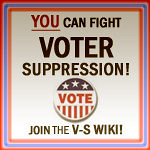Update on the Workshop on Last-minute strategies for reducing voter suppression
Update: w00t, w00t, Voter Suppression Wiki is mentioned in Noam Cohen’s Casting a Ballot, and a Wary Eye in the New York Times — and I’m quoted (“The interesting challenge — the story in progress — is how do we coordinate our effortsâ€)!  Mom will be proud 🙂
 We’re roughly at the midpoint of the Voter Suppression Wiki’s Workshop on Last-minute strategies for reducing voter suppression. After brainstorming and identifying opportunities over the weekend, we’re going to be starting to draft the report today. Tomorrow, we’ll begin work on the press release as well, and issue both the report and press release Wednesday morning at 9 a.m.
We’re roughly at the midpoint of the Voter Suppression Wiki’s Workshop on Last-minute strategies for reducing voter suppression. After brainstorming and identifying opportunities over the weekend, we’re going to be starting to draft the report today. Tomorrow, we’ll begin work on the press release as well, and issue both the report and press release Wednesday morning at 9 a.m.
We made a huge amount of progress on our Saturday conference call, with some common themes jumping out — in particular, opportunities for community organizations, media, and bloggers to supplement all the work going on. A good example: Linda talked about how when she discovered she had been removed from the rolls, she found a link on MSNBC that directed her to the 1-866-OUR-VOTE Election Protection hotline who helped her get in touch with the right people. If information like this was featured prominently on the front pages of mainstream media web sites, it could help a lot of voters …


 I think I’ll let others tell the story for me …
I think I’ll let others tell the story for me …